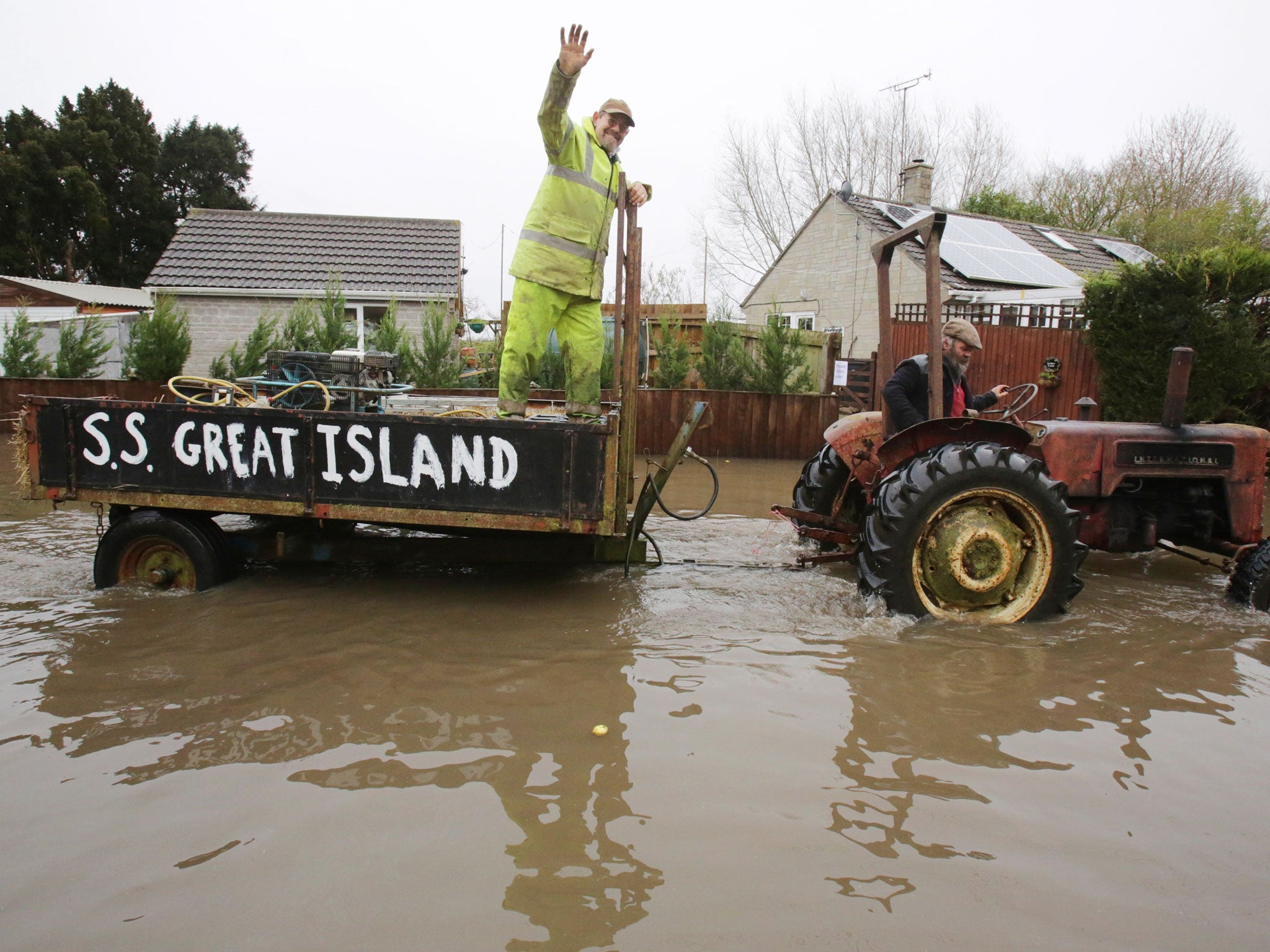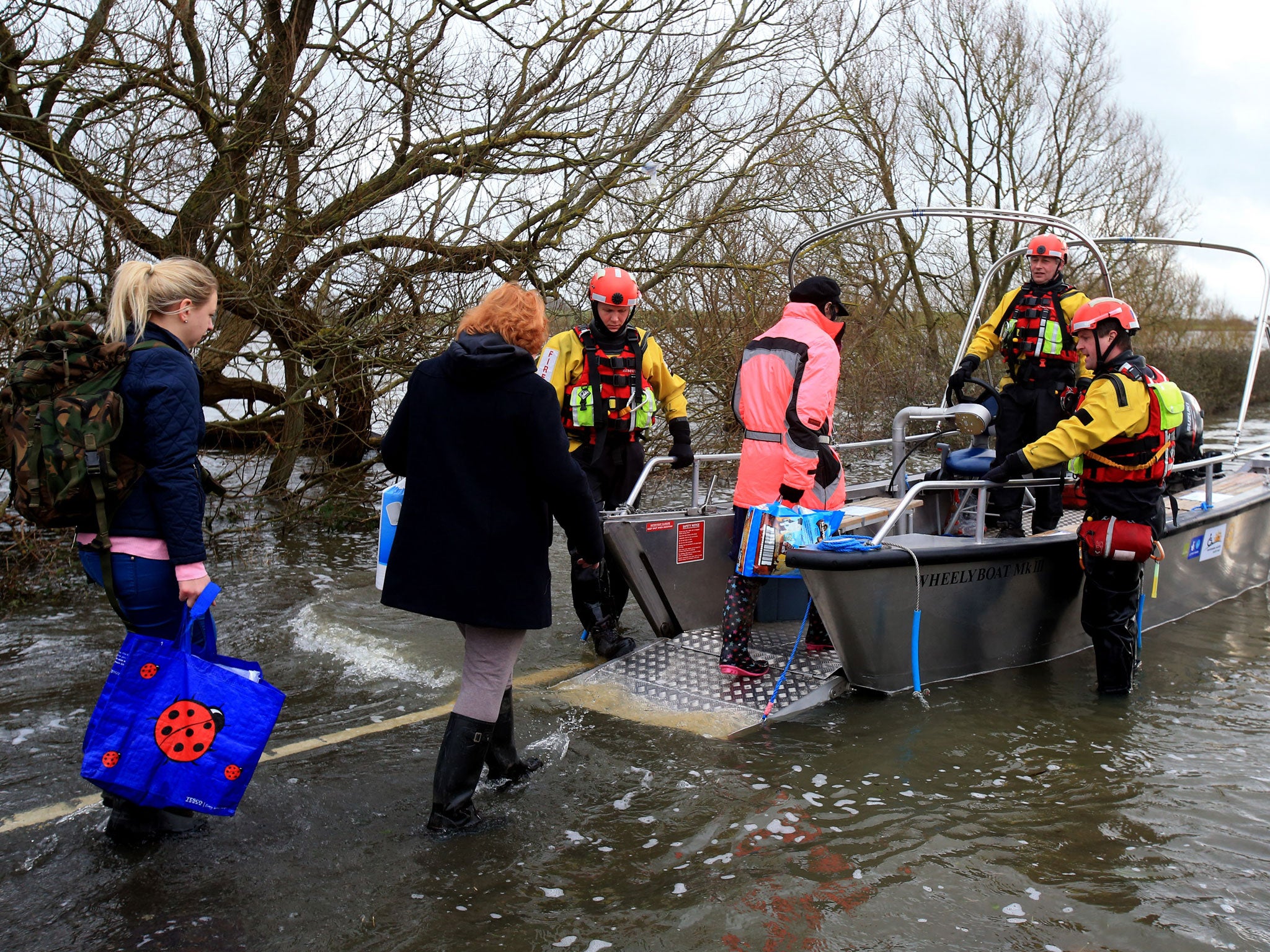Villagers tire of island life on flooded Somerset Levels
For nearly a month, residents of Muchelney and Thorney have been cut off from the ‘mainland’ after heavy rains

The residents of Muchelney are rightly proud of their church. St Peter and St Paul’s dates back to the days of the Domesday Book and dominates the surrounding countryside of the Somerset Levels.
In recent weeks, though, it has become not just a place of worship, but a food distribution point and impromptu community centre for the 200 residents of the village, who have been completely cut off for almost a month by the worst floods in 90 years.
Since the water slowly rose on 2 January, the well-to-do villages of Muchelney and nearby Thorney have been “islands” separated from the “mainland” by flood waters as deep as 4m. The only way in or out has been by boat – or with the help of charitable local farmers and their big-wheeled tractors.
Yesterday the deluge continued, forcing the local council to declare a “major incident” as the Met Office gave an amber warning for rain. With 10 to 20mm forecast to fall on the saturated ground over the next few days, the villagers are braced for another difficult weekend.
From 8am yesterday, as has been the case for three weeks, members of White Watch from Bridgewater Fire Station were running a “humanitarian” ferry boat from the nearby village of Langport. Paid for by Somerset County Council, it has become a lifelime for the village, carrying children to school and adults to work and the shops.
Waiting for the boat yesterday was Tina Backwell, off to meet her mother who was travelling to the “mainland” for only the second time since early January. She said: “It started out as a nuisance for the adults and a bit of fun for the children, but it really has gone on far too long now. Other towns have built new homes or got flood defences. Where has all that water ended up? Here, that’s where.”
Her mother, Sandra Peggram, soon arrived on the small metal motorboat. She was more stoical and full of praise for its crew. “I’ve been stuck in the village like everyone else. It was the same story last year, but nothing has been done and here we are again.”

The Independent is the only passenger on the short motor across to Muchelney and the firefighter crew admits it’s “cold and dank work” but “well worth it to keep the community connected”.
The crew is pleased to hear that the county council is building a footbridge on the mainland to make the walk from the jetty to the centre of Langport easier. But it won’t remove the need for the boat journey. And as we passed a flooded car that foolishly tried to tackle the road earlier this month, the crew said it expects to be on “ocean-going duties” well into next month.
The journey takes five minutes, with water covering fields on either side. The “island” (the locals really are calling it that) is waxed jacket and Range Rover territory, but there’s a strong community spirit and a warm welcome, despite the weeks of relative isolation and sometimes unwanted media attention. The Sun, much to the disappointment of the community, sent a Page Three model to pose for picture. She was quickly sent back to the mainland.
“This is a very close knit village,” said Richard England, whom other residents have described as a “stalwart” and an unofficial spokesman for the community. “We’ve really come together at the church, getting food and post distributed, helping the elderly. There was even a party at the local pub yesterday with about 20 of us with rather too much red wine, but this has gone on too long.”
The pub is in the next village, so the party was possible only with the help of a farmer’s tractor. But Mr England was serious about the predicament. “The last time there was a flood of this scale was in 1928, and I don’t think it’s a coincidence that the Environment Agency no longer dredges the local rivers. We know we live on the Somerset Levels and roads and fields will flood, but it’s not normal for homes to flood or us to be cut off for so long.”
Fellow resident Anita Vaughan Johnson, who was walking her Jack Russell, agreed: “I’m fed up of being fobbed off by the Environment Agency who have been notoriously idle for years,” she said. “They’ve been warned they need to dredge the rivers, and instead of saying sorry or doing something to prevent it, they’ve given excuse after excuse.”
Sorting parcels at the church was warden Elizabeth Nightingale. “It’s not that we don’t value conservation efforts,” she said, “but the Somerset Levels have been a managed areas for generations and the balance between ecology and flood prevention is now the wrong way around.”
Most residents echoed this polite call for action, but Somerset MP Ian Liddell-Grainger didn’t hold back yesterday. “The Environment Agency has lost control. It has only offered excuses, platitudes, and inaccuracies for failing to carry out the work they promised last year,” he said. “Obviously we are less important than birds and bees.”
A spokesman for the Environment Agency pointed to the “sheer volume” of rain that has fallen in recent weeks and said clearing channels is an “important part” of its maintenance regime, adding that “dredging is often not the best long-term or economic solution compared with other flood risk measures”.
Mrs Johnson, who was still doing laps of the little island with her dogs as The Independent departed, agreed: “We’re all getting rather fed up of friends asking us whether it’s wonderful here in splendid isolation. The truth is we are all getting very cranky.”
Join our commenting forum
Join thought-provoking conversations, follow other Independent readers and see their replies
0Comments